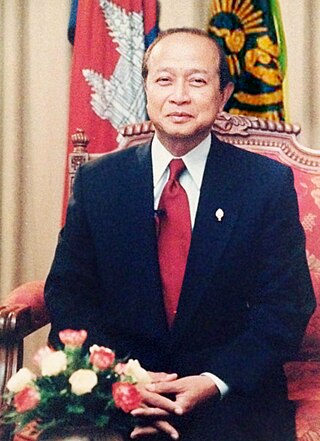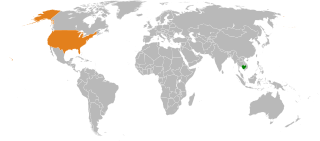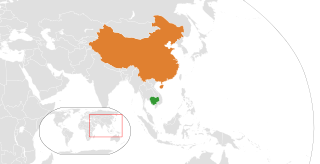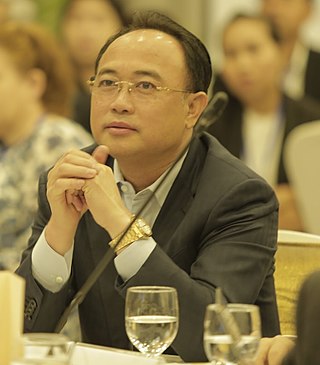| |||||
| Decades: | |||||
|---|---|---|---|---|---|
| See also: | Other events of 2006 List of years in Cambodia | ||||
The following lists events that happened during 2006 in Cambodia .
| |||||
| Decades: | |||||
|---|---|---|---|---|---|
| See also: | Other events of 2006 List of years in Cambodia | ||||
The following lists events that happened during 2006 in Cambodia .
The history of Cambodia, a country in mainland Southeast Asia, can be traced back to Indian civilization. Detailed records of a political structure on the territory of what is now Cambodia first appear in Chinese annals in reference to Funan, a polity that encompassed the southernmost part of the Indochinese peninsula during the 1st to 6th centuries. Centered at the lower Mekong, Funan is noted as the oldest regional Hindu culture, which suggests prolonged socio-economic interaction with maritime trading partners of the Indosphere in the west. By the 6th century a civilization, called Chenla or Zhenla in Chinese annals, firmly replaced Funan, as it controlled larger, more undulating areas of Indochina and maintained more than a singular centre of power.

Norodom Sihanouk was a Cambodian statesman, Sangkum and FUNCINPEC politician, film director, and composer who led Cambodia in various capacities throughout his long career, most often as both King and Prime Minister of Cambodia. In Cambodia, he is known as Samdech Euv. During his lifetime, Cambodia was under various regimes, from French colonial rule, a Japanese puppet state (1945), an independent kingdom (1953–1970), a military republic (1970–1975), the Khmer Rouge regime (1975–1979), a Vietnamese-backed communist regime (1979–1989), a transitional communist regime (1989–1993) to eventually another kingdom.

Cambodia, officially the Kingdom of Cambodia, is a country in Mainland Southeast Asia, spanning an area of 181,035 square kilometres, bordered by Thailand to the northwest, Laos to the north, Vietnam to the east, and the Gulf of Thailand to the southwest. The capital and most populous city is Phnom Penh.

After the fall of the Pol Pot regime of Democratic Kampuchea, Cambodia was under Vietnamese occupation and a pro-Hanoi government, the People's Republic of Kampuchea, was established. A civil war raged during the 1980s opposing the government's Kampuchean People's Revolutionary Armed Forces against the Coalition Government of Democratic Kampuchea, a government in exile composed of three Cambodian political factions: Prince Norodom Sihanouk's FUNCINPEC party, the Party of Democratic Kampuchea and the Khmer People's National Liberation Front (KPNLF).

Samdech Hun Sen is a Cambodian politician and former military general who served as the prime minister of Cambodia from 1985 to 2023. Hun Sen is the longest-serving head of government in Cambodia's history. He is the president of the Cambodian People's Party (CPP), which has governed Cambodia since 1979, and a member of the National Assembly for Kandal. His full honorary title is Samdech Akka Moha Sena Padei Techo Hun Sen.

The National United Front for an Independent, Neutral, Peaceful and Cooperative Cambodia, commonly referred to as FUNCINPEC, is a royalist political party in Cambodia. Founded in 1981 by Norodom Sihanouk, it began as a resistance movement against the People's Republic of Kampuchea (PRK) government. In 1982, it formed a resistance pact with the Coalition Government of Democratic Kampuchea (CGDK), together with the Khmer People's National Liberation Front (KPNLF) and the Khmer Rouge. It became a political party in 1992.
In January 2003, a Cambodian newspaper article falsely alleged that Thai actress Suvanant Kongying claimed that the Angkor Wat belonged to Thailand. Other Cambodian print and radio media picked up the report and furthered nationalistic sentiments, which resulted in riots in Phnom Penh on 29 January where the Thai embassy was burned and commercial properties of Thai businesses were vandalized. The riots reflect the fluid historical relationship between Thailand and Cambodia, as well as the economic, cultural and political factors involving the two countries.

Norodom Ranariddh was a Cambodian prince, politician and law academic. He was the second son of King Norodom Sihanouk of Cambodia and a half-brother of King Norodom Sihamoni. Ranariddh was the president of FUNCINPEC, a Cambodian royalist party. He was also the first Prime Minister of Cambodia following the restoration of the monarchy, serving between 1993 and 1997, and subsequently as the President of the National Assembly between 1998 and 2006.

Norodom Chakrapong is a Cambodian politician, businessman and former major-general of the Royal Cambodian Armed Forces. He is the fourth son of Norodom Sihanouk of Cambodia and also a half-brother of the current king, Norodom Sihamoni. Chakrapong started his career as a military pilot in 1963. After Sihanouk was overthrown in 1970, Chakrapong spent time under house arrest, then in Beijing as the Head of Protocol of then-Prince Sihanouk, afterwards living overseas before he joined the Funcinpec in 1981 and fought against Vietnamese occupation as a commander of the Armée Nationale Sihanoukiste. In 1991, Chakrapong left Funcinpec to join the Cambodian People's Party (CPP) and served as the Deputy Prime Minister of Cambodia between 1992 and 1993. When the CPP lost the 1993 general elections, Chakrapong led a secession attempt in 1993. In 1994, he was accused of joining a failed coup attempt which led him to be sent into exile. After Chakrapong was pardoned in 1998, he founded a private airline company, Royal Phnom Penh Airways. The airlines later stopped all operations in early 2006.

Sam Rainsy is a Cambodian activist, economist and politician who most recently served as the Leader of the Opposition. He is now the interim leader of the Cambodia National Rescue Party due to the continued ban on political activity by the party's leader, Kem Sokha.

Sar Kheng is a Cambodian politician. He is the vice president of the ruling Cambodian People's Party and served as Minister of the Interior and deputy prime minister from 1992 to 2023. He also represents the province of Battambang in the Cambodian Parliament. Kheng has been the Minister of the Interior since 1992. Until March 2006, he shared the position with FUNCINPEC party member You Hockry as co-Ministers of the Interior, but then became sole interior minister in a cabinet reshuffle as FUNCINPEC ended its coalition with the CPP.

Bilateral relations between the United States and Cambodia, while strained throughout the Cold War, have strengthened considerably in modern times. The U.S. supports efforts in Cambodia to combat terrorism, build democratic institutions, promote human rights, foster economic development, eliminate corruption.

The bilateral relations between the Kingdom of Cambodia and the People's Republic of China have strengthened considerably after the end of the Cambodian–Vietnamese War, during which China had supported the Khmer Rouge against Vietnam.

Mu Sochua is a Cambodian politician and rights activist. She was a Member of Parliament (MP) for Battambang from 2013 to 2017, a seat which she previously held from 1998 to 2003. She was a member and Vice President of the Cambodia National Rescue Party (CNRP) until its dissolve, and previously a member of the Sam Rainsy Party (SRP) prior to its merger with the Human Rights Party. As a member of FUNCINPEC, she also served as Minister of Women and Veterans' Affairs in Hun Sen's coalition government from 1998 to 2004. She is currently one of 118 senior opposition figures serving a five-year ban from politics following a court ruling on 16 November 2017.

Kith Meng is a Cambodian businessman sometimes dubbed as "Mr. Rough Stuff". He is the chairman and CEO of The Royal Group which counts among its holdings 45% of J Trust Royal Bank, the mobile phone operator Cellcard and 100% of Royal Railways. Meng also owns 100% stake in Cambodia's television and telecommunications networks CBS, Hydro Power Lower Sesan 2, a 400MW plant, Chailease Royal Leasing and Chailease Royal Finance in partnership with Chailease of Taiwan, Cambodian Broadcasting Corporation and CamGSM. Meng is known for his preference for entering Cambodian companies into joint ventures with international companies.

Mam Sonando is a Cambodian radio journalist and politician with French dual citizenship. He is the owner and director of Phnom Penh's Beehive Radio, which the Committee to Protect Journalists (CPJ) described in 2012 as "one of Cambodia's few independent news outlets". He also acts as a political commentator for the station.

Australia entered into diplomatic relations with Cambodia in 1952. In 1955, the first Australian legation was opened in Phnom Penh, with the Australian minister to Cambodia previously working out of Saigon, modern day Ho Chi Minh City, Vietnam. The Cambodian Embassy to Australia is located in the nation's capital, Canberra.

Samdech Hun Manet is a Cambodian politician and general who has been serving as the prime minister of Cambodia since 2023, succeeding his father, Hun Sen. He is also the vice president of the ruling Cambodian People's Party. Prior to his political appointment, he served in the Royal Cambodian Armed Forces (RCAF) as deputy commander-in-chief and the commander of the Royal Cambodian Army. He is the second-eldest son of former prime minister Hun Sen and Bun Rany. Upon appointment as prime minister, he was granted the highest civilian honorary title of Samdech Moha Borvor Thipadei Hun Manet.
The following lists events that happened during 2013 in Cambodia.
Samdech is a Cambodian honorific bestowed by the King of Cambodia to individuals deemed to have made significant contributions to the nation. It roughly translates as "lord". It is often accompanied by a longer title; for instance, Prime Minister Hun Sen's full title is Samdech Akka Moha Sena Padei Techo Hun Sen. Some members of the royal family and religious leaders also have "Samdech" as part of their title. In July 2016, the government ordered the media to use leaders' full titles.